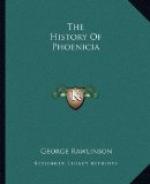After this, we hear but little of any separate action on the part of the Phoenicians, or of any Phoenician city, during the Seleucid period. Phoenicia became rapidly Hellenised; and except that they still remained devoted to commercial pursuits, the cities had scarcely any distinctive character, or anything that marked them out as belonging to a separate nationality. Greek legends became more frequent upon the coins; Greek names were more and more affected, especially by the upper classes; the men of letters discarded Phoenician as a literary language, and composed the works, whereby they sought to immortalize their names, in Greek. Greek philosophy was studied in the schools of Sidon;[14460] and at Byblus Phoenician mythology was recast upon a Greek type. At the same time Phoenician art conformed itself more and more closely to Greek models, until all that was rude in it, or archaic, or peculiar, died out, and the productions of Phoenician artists became mere feeble imitations of second-rate Greek patterns.
The nation gave itself mainly to the pursuit of wealth. The old trades were diligently plied. Tyre retained its pre-eminence in the manufacture of the purple dye; and Sidon was still unrivalled in the production of glass. Commerce continued to enrich the merchant princes, while at the same time it provided a fairly lucrative employment for the mass of the people. A new source of profit arose from the custom, introduced by the Syro-Macedonians, of farming the revenue. In Phoenicia, as in Syria generally, the taxes of each city were let out year by year to some of the wealthiest men of the place,[14461] who collected them with extreme strictness, and made over but a small proportion of the amount to the Crown. Large fortunes were made in this way, though occasionally foreigners would step in, and outbid the Phoenician speculators,[14462] who were not content unless they gained above a hundred per cent. on each transaction. Altogether, Phoenicia may be pronounced to have enjoyed much material prosperity under the Seleucid princes, though, in the course of the civil wars between the different pretenders to the Crown, most of the cities had, from time to time, to endure sieges. Accho especially, which had received from the Lagid princes the name of Ptolemais, and was now the most important and flourishing of the Phoenician towns, had frequently to resist attack, and was more than once taken by storm.[14463]




